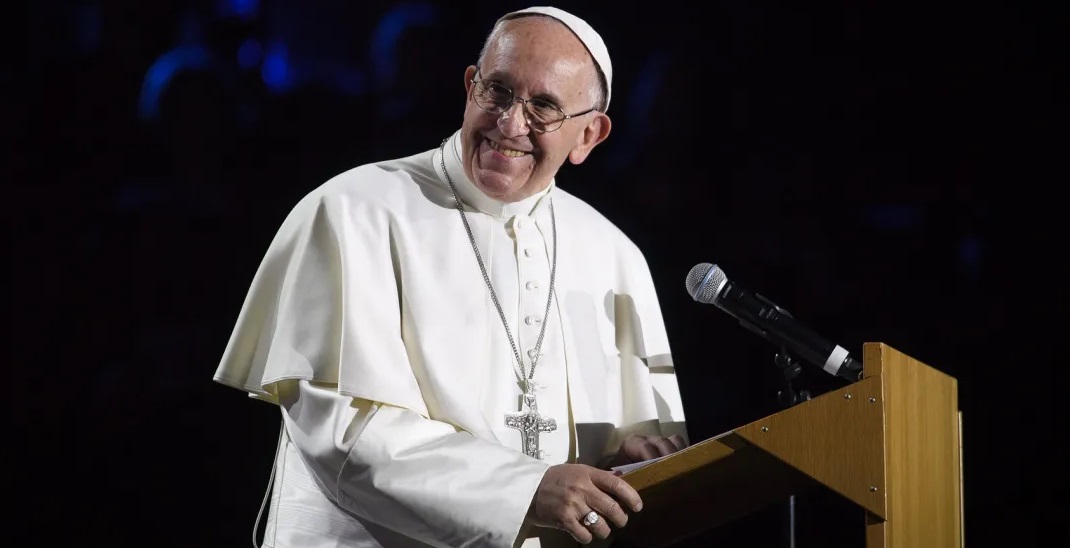LWF gives thanks for life and legacy of Pope Francis
The Lutheran World Federation (LWF) joins Catholics and other faith communities across the world in mourning the loss of Pope Francis, who died on Easter Monday, 21 April 2025, at the age of 88.
Apr 25, 2025

GENEVA: The Lutheran World Federation (LWF) joins Catholics and other faith communities across the world in mourning the loss of Pope Francis, who died on Easter Monday, 21 April 2025, at the age of 88. The Argentinian pontiff was recovering from bilateral pneumonia in his Vatican residence at the Casa Santa Marta.
Recalling the significant progress made on the journey “from conflict to communion” during his 12-year pontificate, LWF General Secretary Rev. Dr Anne Burghardt gave thanks for the pope’s commitment to strengthening ecumenical and interfaith relations and to witnessing to the gospel through compassionate service to the neighbor. She said: “As we mourn his death, we give thanks for his life and legacy of reform, renewal, unity, which opened doors of dialogue and brought the church closer to people from all walks of life.”
Born Jorge Mario Bergoglio in Buenos Aires, Argentina, the son of an Italian immigrant family, the future pope trained as a chemist and worked as a lab technician before joining the Jesuit order in 1958. He rose through the ranks and was appointed archbishop of the city in 1998. Three years later, he was named a cardinal by Pope John Paul II.
Following the surprise resignation of Pope Benedict XVI in 2013, Bergoglio was elected to the papacy on 13 March that year, becoming the first Jesuit pope, as well as the first from the global South. He was also the first Catholic leader to take the name of Francis after the saint from Assisi, who was known as a man of poverty, peace and protection of creation.
In his opening greetings on that March evening in 2013, he identified himself first and foremost as Bishop of Rome, continuing an invitation issued by Pope John Paul II, to reflect on the role and function of the Petrine ministry. He has urged the Roman Catholic Church on a synodal journey and has focused on the ecumenical nature of that process, inviting all world communions, including the LWF to participate.
A hallmark of his pontificate was work to lead the Roman Catholic Church on that synodal journey, calling for greater participation of lay people in decision making and becoming the first pope to appoint women in top leadership positions. He convened and presided over the 4-year process of synodal reflection within the Roman Catholic Church leading to the historic Synod of Bishops in October 2024.
Pope Francis continually emphasized the need for a humble and synodal Church guided by the Holy Spirit to fulfill its mission of peace and forgiveness in the world.
He was outspoken in his defense of the poor and people in marginalized communities, particularly migrants and refugees, displaced persons, and asylum seekers. He called on all leaders, political and religious, to act. "For everything done to help these persons in need of protection is a great gesture of solidarity and a recognition of their dignity. For us Christians, it is a priority to go out and meet the outcasts and the marginalized of our world, and to make felt the tender and merciful love of God, who rejects no one and accepts everyone.” (Homily, Malmö, 2016).
His commitment to care of the environment was enshrined in a 2015 Encyclical ‘Laudato SI, which urges Christians and all people of goodwill to hear “the cry of the earth and the cry of the poor.” The document, published ahead of the crucial COP21 summit in Paris, was welcomed by the LWF, as well as by many other religious and political leaders.
From his years as archbishop of Buenos Aires, Bergoglio was known for his friendships with leaders of other Christian churches and other faith communities. As pope, he continued to reach out and promote ecumenical and interfaith cooperation, urging Christian leaders to “walk, pray and work together so that, with God’s help, unity may grow and the world may believe.”
On 31 October 2016, he joined leaders of the LWF in the Swedish cities of Lund and Malmö for events marking the 500th anniversary of the Reformation. Building on half a century of Lutheran-Catholic dialogue, in particular the landmark 1999 Joint Declaration on the Doctrine of Justification, he joined former LWF President Munib Younan and former General Secretary Martin Junge in Lund Cathedral, calling on Christians to “move away from a past overshadowed by conflict and division and to walk the paths of communion.” In that commemoration, Pope Francis gave thanks for the gifts the Reformation brought to the church. And he pointed to that “primordial intuition of God’s people, who naturally yearn to be one” (Homily, Lund, 2016).
Following on from that prayer service, focused on the themes of thanksgiving, repentance and a commitment to joint witness, Pope Francis and the LWF leaders moved to Malmö Arena for the signing of a Declaration of Intent between the LWF’s World Service and Caritas Internationalis, the Catholic confederation of aid and development agencies. The declaration commits both organizations to closer practical cooperation in humanitarian and development work. Practical ecumenism was a top priority for Pope Francis, ecumenism in action.
In June 2024, Pope Francis met with LWF President Henrik Stubkjær, as well as General Secretary Burghardt and the seven vice-presidents elected at the Kraków Assembly, describing the visit as “an important gesture of ecumenical fraternity.” Reflecting on the Holy Year of Hope, which is being celebrated by the Catholic Church in 2025, he urged Lutherans to “remember that our shared spiritual roots are found in the ‘one baptism for the forgiveness of sins’ and thus move forward with confidence as pilgrims of hope.” --LWF







Total Comments:0